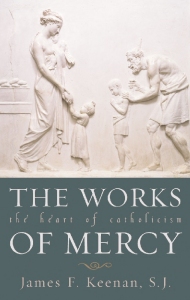
|
Posted February 9, 2005
Book: The Works of Mercy: The Heart of Catholicism Author: James F. Keenan, S.J. Sheed and Ward, New York, pp. 118 An Excerpt from the Jacket:
In the first two of three parts, Father Keenan explores modern applications of the corporal works of mercy — visiting the prisoner, sheltering the homeless, feeding the hungry, giving drink to the thirsty, visiting the sick, clothing the naked, burying the dead — and the spiritual works of mercy — reconciling being vigilant for the spiritual needs of one’s neighbor, and praying. The third part of the book looks at the effective work of mercy in the prayer of the church, particularly in the Eucharist. Complete with meditations on September 11, 2001, and the priesthood in light of the scandals in the church, The Works of Mercy: The Heart of Catholicism is a bridge between the past and the present and is a must-read for students, parish groups, and individual readers seeking to live their faith in the everyday world. An Excerpt from the Book: Over the past four years, I have been writing a column in Church magazine about mercy and its willingness to enter into the chaos of another. But during the past two years in Boston, I have come to learn a great deal about what it means to be a priest today. In my experience, I find that as I enter into other people’s chaos, I also enter into my own, which teaches me just how limited I am. I used to think that that insight was a curse. I realize now it is a blessing. For that reason, I want to share with you what one needs to be a minister of mercy. Foremost among these needs is the humility that comes of self-knowledge. Let me tell you how I started my presentation last month to a group of sixteen Jesuits who would be ordained the following week to the diaconate as a final stage of their preparation for priestly ordination. “I am not a well-ordered person. Seriously, I don’t say that to make anyone impressed with my humility. I know myself and as I stand before God, the only thing I can think of is my gratitude for the mercy of Christ’s death and resurrection which he accomplished for me.” I tried to tell them that I am mature, I am responsible, but inside of me the pieces do not come together as well as I would like. As Walt Whiteman wrote in “Song of Myself,” I contain multitudes.” That’s me to a tee. I write on virtues and recognize the claim of the “unity of the virtues”, but that claim is far off on the horizon of my expectations. I am pulled in a variety of directions only. I bring my multitudes into my prayer. When I preside at the 5 p.m. Sunday liturgy at St. Peter’s in Cambridge, I process down the aisle, singing the entrance song with the choir and congregation. When I get to the altar, I reverence it with a kiss and pause and say, “I hand myself completely over to you.” I learned this after many years of pausing, kissing the altar, and thinking to myself, “What am I doing here. I have no business being here.” Now I simply let go in prayer. Despite all our protestations, now of us lives transparent lives and I, with my multitudes, am amazed at where I am now. I am a priest, in Boston no less, writing about ethics. Table of Contents: I. The Corporal Works of Mercy 1. Mercy distinguishes Catholic morality 2. The Corporal Works of Mercy 3. Visit the prisoner 4. Shelter the homeless 5. Feed the hungry 6. Give drink to the thirsty 7. Bury the dead 8. Visit the sick 9. Clothe the naked II. A Meditation on Mercy in Light of September 11, 2001 10. Burying the dad III. The Spiritual Works of Mercy 11. The spiritual works of mercy 12. A reconciling spirit 13. Being vigilant 14. Prayer IV. A Meditation on Priesthood in Light of the Church’s Scandals 15. Being a minister of mercy V. Mercy and Eucharistic Liturgy 16. The entrance rite 17. The liturgy of the word 18. The liturgy of the Eucharist 19. Communion |
|
